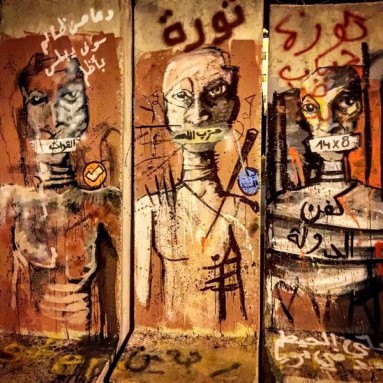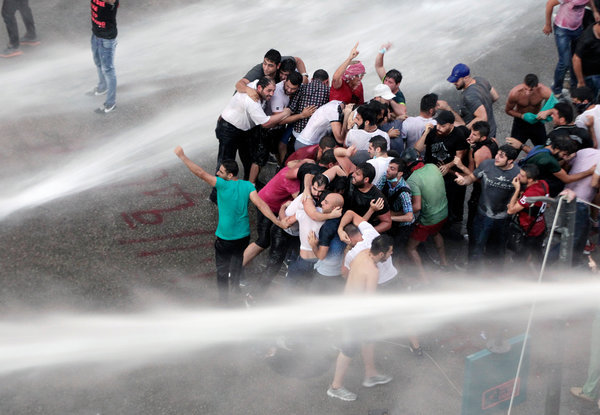Αναδημοσιεύουμε το ενδιαφέρον άρθρο με τίτλο “Scents of an Ending” για το κίνημα των σκουπιδιών στον Λίβανο. Το πρωτότυπο μπορεί να βρεθεί εδώ.
Scents of an Ending
By MAHMOUD MROUEH
The #YouStink protests will either consign the Lebanese regime to the dustbin of history, or go in its place.
We came from different backgrounds, we didn’t agree on much, but we hit the streets together. On the 8th of August, we assembled to voice our discontentment with the Lebanese government’s handling of a garbage crisis that had been 18 years in the making. Naameh, a small town by the sea 20 km south of Beirut, had functioned as the capital city’s garbage dump since 1997. The residents of Naameh had been demanding the closure of the landfill in their town for years with hundreds of protests, and it was finally slated to be shut on the 17th of July in 2015. When the day came, the residents of Naameh threatened direct action; they vowed to obstruct the entry of garbage trucks into their town using any necessary means. Their skepticism came from bitter experience. The government had reneged on its promises to close down the landfill twice in the preceding 18 months alone. The landfill was forcibly put out of business that day by the residents of Naameh, and without an alternative plan in place, the garbage began to pile on the streets of Beirut.
This wasn’t the first protest in response to the garbage crisis, but it was definitely the largest. Over a thousand people gathered in Beirut’s Martyrs Square that day. The streets of Beirut had been cleared of trash by then, but the government had yet to agree on a permanent solution to Beirut’s garbage problem. A temporary fix had been found, we were told, the specificities of which are still shrouded in mystery. Trucks carrying garbage were seen dumping their cargo into valleys and onto the roadside in the dead of night in different areas of the country. The protest attracted a varied group of people, including but not limited to civil society activists, environmental and student groups, academics, and a notable media presence. Infighting began almost immediately, which should not have come as a surprise. Those present belonged to a diverse spectrum of political and ideological camps, united despite it all in their denunciation of the government’s dismal attempts at finding a permanent and sustainable solution to the country’s waste management problem.
After listening to more than a few disappointing speeches by the “You Stink” campaign’s organizers and other “civil society activists,” some of the more radical protesters in the square began to call upon those present to join in trying to storm the parliament building in Beirut’s Place De L’Etoile, a two-minute walk away from where we were assembled. The anger in the square was palpable, and the majority of those present headed for parliament. We were met with baton-wielding soldiers of the Lebanese Armed Forces. Seeing as entry into parliament would not be possible, we then headed for the Grand Serail, the Prime Minister’s headquarters and where Lebanon’s cabinet holds its sessions. The building was cordoned off, and there dozens of riot police were not at all reserved when it came to subjecting us to their violence. We abandoned our project and headed for the Municipality of Beirut — where we were not expected. There, we almost stormed the building, but were once again beaten back by the police.
margin-ad-rightExactly two weeks later, we held our second protest. “You Stink” had now morphed into a mass movement. There were over 15,000 people in Riad al-Solh Square that day. The movement had also undergone a qualitative change. The protest in Martyrs Square two weeks before was overwhelmingly composed of the middle and upper-middle classes of Lebanese society. This protest two weeks later was considerably less exclusive, less bourgeois. There was a large turnout from some of Beirut’s impoverished suburbs and inner neighborhoods. The protesters’ demands had also evolved in reaction to the government’s handling of the previous protest. Calls for solutions to issues like Lebanon’s infamous electricity cuts and water shortages were now at the forefront. The garbage crisis may have spurred this movement into existence, but the it was only a symptom of the disease that ails Lebanon’s political system. The movement is becoming more radical: its focus with every protest has been slowly but surely edging towards addressing the root of the problem rather than its apparent manifestations. By now, many were chanting for revolution and openly calling for the fall of the regime.
The Lebanese state is not monolithic. It can neither be localized in an individual nor in a party. It is not a “regime” in the traditional sense. At the end of the Lebanese Civil War, warring factions signed the Taef Agreement, which only served to reinforce and perpetuate already-existing sectarian divisions through the tired notion of “mutual coexistence” between Lebanon’s different sects. This effectively insured the Lebanese old guard’s dominance over national politics for years to come. The same individuals who once commanded sectarian militias during the Civil War discarded their military fatigues for suits and ties, and ran for office (or were appointed). Aside from those with blood on their hands, a class of wealthy businessmen with hefty political ambitions also came onto the scene during the 1990s. Our government today is infested with individuals from both groups and/or their children and henchmen, who managed to seamlessly collude in joint pursuit of their private interests. Thus the marriage of private capital to the Lebanese state came to pass, and the Lebanese ruling class now treats the state as businesspeople would treat their private company.
It is not a secret that those who hold power in Lebanon are corrupt. You would be hard-pressed to find a single Lebanese citizen who would deny it. Many Lebanese politicians made massive fortunes when in office. In spite of this, the same names and faces are repeatedly voted into office come election season. They manage to invoke loyalty through sectarian fearmongering and what can only be described as blatant bribery of the electorate. It must also be said that a viable non-sectarian political alternative that is able to challenge the Lebanese ruling class’s grip on the populace has yet to emerge, and for this, we only have ourselves to blame. This current parliament, however, unconstitutionally extended its own term in May of 2013, and then again in November of 2014. As it stands, MPs will now hold office up until 2017. This had led many of those on the ground today to argue that our priorities must be to force a dissolution of parliament and hold immediate parliamentary elections.
The Lebanese state responded frantically to the protests on August 22nd and 23rd. We were targeted with rubber bullets, water cannons, tear gassed, beaten, and live ammunition was used to disperse the protesters. There was talk of “infiltrators,” supposedly sent to the protests by their political parties to provoke the police into a violent response. It is important that this be addressed, as many of the protesters themselves were peddling this propaganda. As someone who was present on the ground, I find these claims to be preposterous. “Infiltrator” was nakedly used as a fill-in for “poor”; it was meant to describe those who did not meet bourgeois standards of decency and respectability. These so-called infiltrators were nothing but angry, disenfranchised young men from working class backgrounds who had much to gain from this movement. But thanks to the bourgeois fear of genuine rage, Lebanese security forces were able to use the supposed presence of these infiltrators as pretext for carrying out mass arrests on the 25th of August.
More than 90 protesters were beaten and detained that day, and they were forbidden access to lawyers and medics. Many were severely injured, whether at the hands of the police in the square or from being beaten post-arrest at the police stations where they were held. One was shot and thought to be dead, though it turned out he was holding on in grave condition. We held a vigil for him under the hospital where he is being treated yesterday; hundreds showed up. Almost all those detained were subject to drug tests as a form of intimidation. They were then billed for these drug tests by security forces upon their release.
By August 23rd, the organizers of the “You Stink” campaign had largely lost control of the situation on the ground. Citing infiltration, the organizers asked that the protest be moved from Riad al-Solh square to nearby Martyrs Square. A large segment of the protesters heeded the organizers’ demand and vacated Riad al-Solh. Shortly after, the police in Riad al-Solh began to get violent, firing live ammunition and targeting us with water cannons and tear gas. The Lebanese Armed Forces were then asked to intervene, and armored personnel carriers, Humvees, and dozens of infantrymen came rolling in to “secure” downtown Beirut. We later found out that those who lead “You Stink” had collaborated with the police on getting protesters out of Riad al-Solh so that security forces may then deal with those “infiltrators” who remain. A strong backlash to this rhetoric is already taking place in the streets. “We are all infiltrators” has become a popular slogan of the movement, widely present at the protests on signs and banners. The term infiltrator itself is slowly being reclaimed by the protesters at large, to serve as a badge of honor rather than of shame.margin-ad-left
You Stink is not the only group organizing for these protests, but it is the one that is granted the most airtime. A number of left-wing organizations and student groups are also heavily present on the ground. The Socialist Forum for example, has been giving out flyers and putting out statements at almost every protest so far. There is a strong, left-wing element to these protests, but it is not dominant on the movement as a whole. There have been chants against banks, the patriarchy, and capitalism at every protest so far. Protesters chanted “against authority and capital, our cause is a class issue” on the 23rd of August in Riad al-Solh, while “down down with the rule of the banks” was a dominant chant on the 26th of August, when protesters gathered in front of the Lebanese Central Bank. The class nature of this struggle cannot be ignored.
Despite the existence of numerous contradictions that still need to be straightened out, there is hope for this movement. This is the first truly independent Lebanese movement for change that I’ve witnessed within my lifetime, and those taking part belong to every sect. The politics of identity which usually dominate the Lebanese political scene have taken a back seat to people coming together to fight for the direct material betterment of their lives. This movement will be doomed to fail, however, if those who “lead” it — that is, those who are given a platform to speak in its name — continue to push back against the participation of working class people in these protests by allying with security forces against so-called infiltrators. In the long run, it is clear that nothing short of the complete dismantling of the sectarian regime, its militias, and the socioeconomic conditions that perpetuate it will bring us justice. We still are a very long way from achieving this goal, and this movement on its own may not reach it. But at the very least, it will enlighten those who act with impunity from parliament and the Serail to the fact that we are not a passive population without agency, and their actions are not without consequence.

